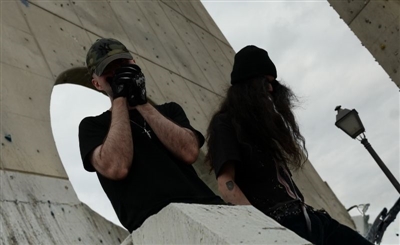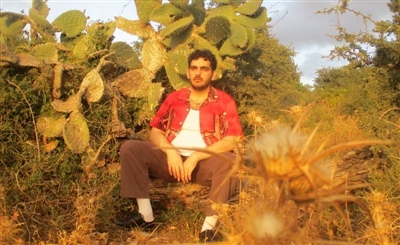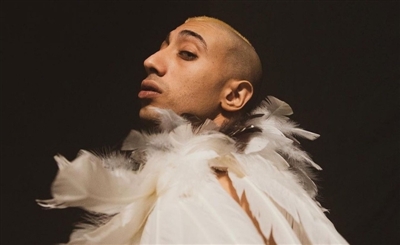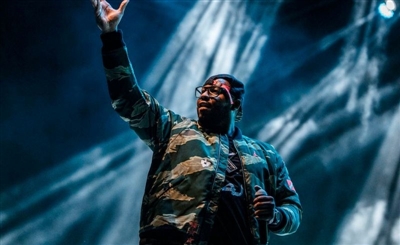El Sabe3: Navigating the Undercurrents of Egyptian Hip-Hop
As a co-founder of digital label Kafr El-Dauwar Records, the rapper has paved a path for emerging artists from Kafr El-Dauwar.

Emerging from the industrial city of Kafr El-Dauwar, Egyptian rapper Mo'men Saad, aka El Sabe3 or VII, stands as a true representative of the city's unique soundscape. As a co-founder of digital label Kafr El-Dauwar Records, in collaboration with YUNIS, Ibrahim X, Sulieman, and Fathy Hawas, El Sabe3 has not only shaped the city's sonic identity but has also paved a path for emerging artists from Kafr El-Dauwar to make their mark in Egyptian hip-hop and shaabi music.
Having ventured into music at a young age, El Sabe3 embarked on a solitary journey with scratch resources, independently honing skills like recording, mixing and mastering. “I don’t know what I was thinking, but I wanted to make a song a rapper in a million-dollar studio can make,” El Sabe3 told SceneNoise. As El Sabe3's knowledge of music production grew, he started recording for artists in his hometown in his home studio, providing a platform for musicians in a community that often overlooked artists.
"At the end of the day, the city I live in influences me, my culture and everything else. So my lyrics are Kafr El-Dauwar because it made me who I am," El Sabe3 shared in the SceneNoise documentary 'Kafr El-Dauwar Records: Egypt's New Unlikely Goldmine of Rap and Shaabi'. Before starting his solo career, El Sabe3 joined a musical collective called A3gamy, which also included the likes of Ibrahim X. However, shortly after he left the band and started releasing music independently on Soundcloud, El Sabe3 slowly gained recognition in the underground rap scene.
Before starting his solo career, El Sabe3 joined a musical collective called A3gamy, which also included the likes of Ibrahim X. However, shortly after he left the band and started releasing music independently on Soundcloud, El Sabe3 slowly gained recognition in the underground rap scene.
Fast forward to the end of 2018, after being on and off for a few years, El Sabe3 - now a chemical engineer - decided to pursue music full time. He released a music video for ‘Alo, Zeus?’ during the launch of Kafr El-Dauwar Records, marking the beginning of a new era that saw the rapper master his craft and deliver multiple releases. Taking the ownership of engineering the sound behind Kafr El-Dauwar Records projects, El Sabe3 started working on the acclaimed album 'Ya Khal' by YUNIS and Ibrahim X, an electro shaabi fusion that cemented the label as one of the most exciting and promising movements in the Egyptian underground scene. The label gained recognition from established critics and music publications, as well as a devoted fanbase across Egypt.
"Sulieman came to me with the idea for the project of the label. Once I heard the name I was in, he already had this idea of putting El Nabatshy (someone who performs in Egyptian traditional weddings) into the studio,” El Sabe3 said. “Yes, we were creating music in a studio, but I couldn't ruin the hallmark of this kind of music. People are used to seeing it through the wedding video cameras, so the audio and sound quality is not good. I used to deliberately distort perfectly recorded sound to capture the live experience, because you won't hear a Nabatshi with autotune." Not so long after the launch of the label, the COVID-19 pandemic put nearly everything on hold. During that time, El Sabe3 joined a recording studio in Alexandria called ‘The 12th Studio’, founded by Ammar Hosny, as an in-house producer and sound engineer. He started working on his first album ‘Alexandria 11’, a conceptual album that saw him exploring themes of melancholy while delving into his inner struggles and existential crisis. "In 'Alexandria 11', I poured out everything inside of me, leaving myself drained, everything that was left in me was grey, I was indecisive about everything in the world,” El Sabe3 said. The seven-track album captured the emotional and personal aspect of his persona, embracing a delicate balance of genres in terms of sonic choices between alternative R&B, hip-hop and shaabi fusions.
Not so long after the launch of the label, the COVID-19 pandemic put nearly everything on hold. During that time, El Sabe3 joined a recording studio in Alexandria called ‘The 12th Studio’, founded by Ammar Hosny, as an in-house producer and sound engineer. He started working on his first album ‘Alexandria 11’, a conceptual album that saw him exploring themes of melancholy while delving into his inner struggles and existential crisis. "In 'Alexandria 11', I poured out everything inside of me, leaving myself drained, everything that was left in me was grey, I was indecisive about everything in the world,” El Sabe3 said. The seven-track album captured the emotional and personal aspect of his persona, embracing a delicate balance of genres in terms of sonic choices between alternative R&B, hip-hop and shaabi fusions.
Following the release of ‘Alexandria 11’, El Sabe3’s identity evolved towards more layered arrangements and heavy sound selections, as he started exploring various hip-hop subgenres and shaabi influenced themes. Influenced by the likes of MF DOOM and J.Cole, the rapper released an array of singles that showcased his wide range and immense potential. From drill beats in ‘Eh Ya Eshta’ to experimental hip-hop in ‘Rok’aa’ to pure mahraganat in ‘El Kobry El Waty’, he established himself as a virtuoso who can hop on any beat seamlessly and deliver a unique performance.
El Sabe3 then began creating his second conceptual body of work titled ‘Ragel Gayed’. The record introduced a new layer of his persona through a cohesive experience, embracing his musical influences between shaabi, trap and experimental hip-hop. The intro for ‘Ragel Gayed’ is a continuation of the outro on his debut album, executed with heavier and more intricate layers, providing a smooth transition between both albums that proves the conceptualization of El Sabe3’s artistry and vision. The album is composed of nine tracks, including one collaboration with Ibrahim X on ‘El-Hares’ and beats by El Sabe3 himself, Shah and Scratch.
“Ragel Gayed showed an angry version of me,” El Sabe3 said. “If you listen, you’ll hear someone shouting all the time, he does not like anything, he does not like anyone. I was empty and I was trying to find myself, and I don’t know why I thought anger was the way to do that, it was just pure anger.”
 Though he might not have received a proper recognition when it came to mainstream success, El Sabe3 continues to make his way through the sphere of Egyptian hip-hop, currently working on his next project: a streak of singles that will be released throughout 2024, which he describes as a skip-ad type of thing: a sequel of singles that are not particularly related to each other, and will ultimately define the phase between ‘Ragel Gayed’ and his next album.
Though he might not have received a proper recognition when it came to mainstream success, El Sabe3 continues to make his way through the sphere of Egyptian hip-hop, currently working on his next project: a streak of singles that will be released throughout 2024, which he describes as a skip-ad type of thing: a sequel of singles that are not particularly related to each other, and will ultimately define the phase between ‘Ragel Gayed’ and his next album.
“Each project I have released is connected to its predecessor and successor, all constituting components of El Sabe3's overarching project, which will ultimately conclude,” El Sabe3 said. “The project of El Sabe3 itself delves into the dynamics of adopting diverse perspectives in specific scenarios. Each viewpoint embodies a distinct character, expressed in various releases. For instance, when confronted with a mugging, you confront choices – to flee, confront, or remain passive. These decisions simultaneously cross your mind, representing different aspects of yourself. You determine which character to embody, shaping the path you take and the outcome you achieve in overcoming challenges. This encapsulates the essence of my project..”
Trending This Month
-
Nov 24, 2025






















